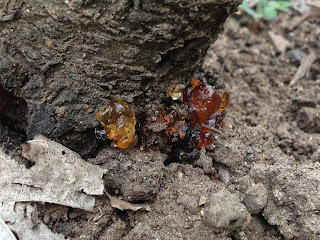Peach Tree Problems
About a week ago, we noticed that we had a problem in the orchard. One of these things is not like the other:
It's not just the leaves of our (formerly) best peach tree that are having trouble. Check out the (former) fruit:
A couple weeks ago this tree was covered with peaches just waiting to ripen up in August, but now they are shriveled down to the pits. It looks more like an almond than a peach. They all look like that.
No peaches this year.
So what's the problem?
Well, it's clear that the tree isn't taking up water, but we've had decent rain, and other trees are fine. As I was looking at the damage and trying to figure it out, I saw a funny bug fly by. I couldn't get a photo, but it was unforgettable. It looked like this:
That's not a bug you forget easily—it looks like a giant wasp with a bright orange belt. So I hit the books (specifically The Backyard Orchardist, our go-to guide) and double checked online to see a color photo of our bug.
It's called a peach tree borer, and they are a menace to young peach trees.
These aren't wasps, but moths, and they burrow under the bark of peaches, nectarines, and plums near the soil line. They lay eggs there, and when the larvae hatch they eat. A lot. That's what causes the damage:
It's a little hard to tell in the photo, but that's where the trunk of our peach tree meets the soil. You can see that a good deal of it has rotted away, and some of the damage is fairly fresh (the reddish, sawdusty holes).
Sometimes the tree oozes gummy sap at the site of the wounds. This is what that looks like on our nectarine tree:
Yup—our nectarine is also in trouble. This explains why it hasn't really grown in the past couple years.
Because the trouble is that we've had peach tree borers for years but didn't realize it. I had seen some of that sap at the roots of our trees pretty much since we planted them, but didn't connect it to an insect problem. And since we had amazing crops, I never gave it another thought.
But…looking back, it hasn't been all peachy. (Sorry.)
One of our peach trees died and had to be replaced in its second year, and the nectarine hasn't put on much growth in the past couple years. Our inability to recognize the problem has cost us big-time, because peach tree borers come back to the same spot year after year, making a small problem explode into a big one as the roots of the trees suffer increasing damage and the tree can't take up enough water to set fruit. Or survive.
We were already talking about giving the orchard an overhaul next spring after we saw how some things recovered (or not) from winter damage. Now it looks like we will be removing two peaches, a nectarine, and the broken Granny Smith apple. It's unlikely that these trees will recover, so we'll take the opportunity to replant half (!!) of the orchard with more spacing. We'll also be much better prepared to deter those peach tree borers and protect our trees while they are young and vulnerable.
I'm putting a nice spin on that, but I'm really crushed about losing what had been by far our most reliably productive fruit tree. I'm also sad to miss out on peach pie and ice cream and chutney.
And peaches. I'm really going to miss juicy, delicious peaches.








How are you planning to battle them when you re-plant?
ReplyDeleteI remember reading somewhere that planting garlic around the base of the trees can help deter borers, since they pupate underground, but I have no idea if it actually works. Also, chickens scratching around the base of the tree might find some of the pupae.
I've also read about painting the trunks to keep them from burrowing into the bark, using a pheromone trap to deter them, etc. I think we'll try a combination from the get-go. Part of our issue here was sheer ignorance when the trees were very young, so hopefully a little prevention will go a long way the second time around!
Delete